Deeper Read: Meet Triple R’s Most Remote Subscriber
Geography is no barrier to subscribing to Triple R – as Cliff Davis well knows. Cliff, a long-time subscriber, is spending his fourth winter at Antarctica’s Casey Research Station. Now an Antarctica correspondent and weather reporter for Radio Marinara, Cliff tells us all about his life during the long winter months of continuous isolation – and what shows he’s blasting at the South Pole.
WORDS BRON BURTON
PHOTOS CLIFF DAVIS
There are plenty of words to describe 2020, some of them perhaps not suitable for publication, but one publishable word we used a lot last year was “remote” – remote working, remote learning, remote broadcasting, remote socialising.
For many of us, lockdown life meant a big adjustment to life as we knew it pre-COVID, dealing with isolation, the sameness of daily routines, and finding ways to do the things we love at a distance – if that was even possible. We made connections with each other in ways we would never have anticipated, often through screens of various shapes and sizes, being present (but not physically) and making it work however we could.
Spending a lot of 2020 doing things remotely gave me a whole new appreciation and admiration for people for whom remoteness is normal. Long-time Triple R subscriber Cliff Davis has mastered remote life – he’s currently spending his fourth winter at Casey Research Station in Antarctica, with many summer stints under his belt as well.
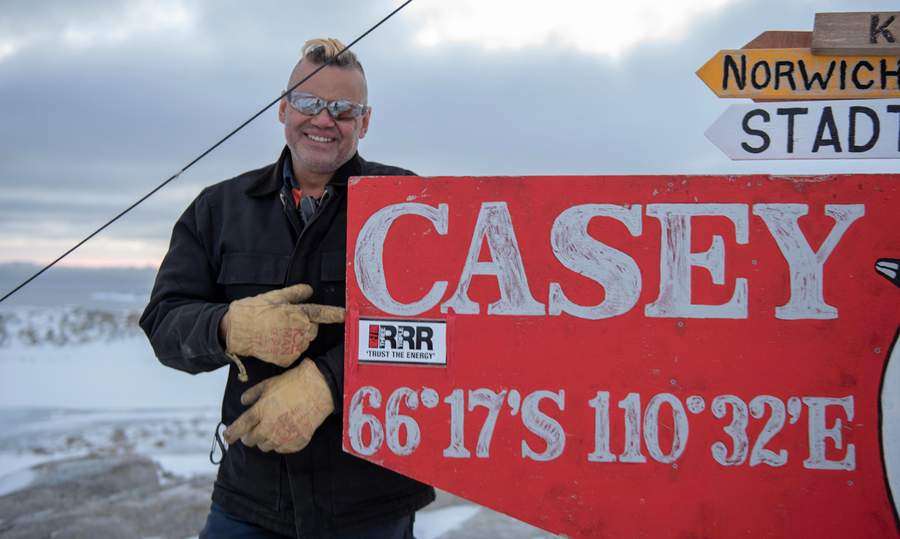
Photo by Cliff Davis
Radio Marinara first connected with Cliff via his Triple R Radiothon subscription many years ago, when he added a comment to his subscription about spending a lot of his life working in Antarctica at one of several research stations managed by the Australian Antarctic Division.
We were pretty excited to connect with Cliff. After talking frequently about Antarctic marine science over the last 25 years, it’s brought a whole new realness to talk with someone like Cliff who actually lives there for months at a time, year after year. Each year since, we’ve been rapt and always grateful to hear from Cliff at Radiothon time.
Last year, during the 2020 Radiothon, while we were all in the midst of lockdown (the “Big One”, if you were in Melbourne at the time), we casually referred to Cliff as “Triple R’s most remote subscriber” when we read out his subscription. At the time, we weren’t really sure whether he was, but as there were no other Triple R listeners subscribing from Antarctica, and, as far as we were aware, none in the Outer Hebrides, on Pitcairn Island, or up there on board the International Space Station, we thought it was a safe bet. After Radiothon, we looked into it – and, as it turns out, Cliff Davis actually is Triple R’s most remote subscriber.
Since the last Radiothon, the Radio Marinara team has had regular connection with Cliff. And throughout 2021, he’s been sending us weather reports every Sunday morning to add to our forecast for Melbourne and surrounds.
His Sunday morning message includes the Casey Station temperature (with added wind chill factor – subtract at least another 20 degrees from an already sub-zero forecast maximum), wind speed (lately gale force), humidity (lately approaching 100 per cent), a weekly aurora forecast (lately stunning), and photos of the glorious 11am sunrise and 2pm sunset that bookends the whopping three hours of sunlight that Cliff and his crew get to enjoy each day throughout winter.
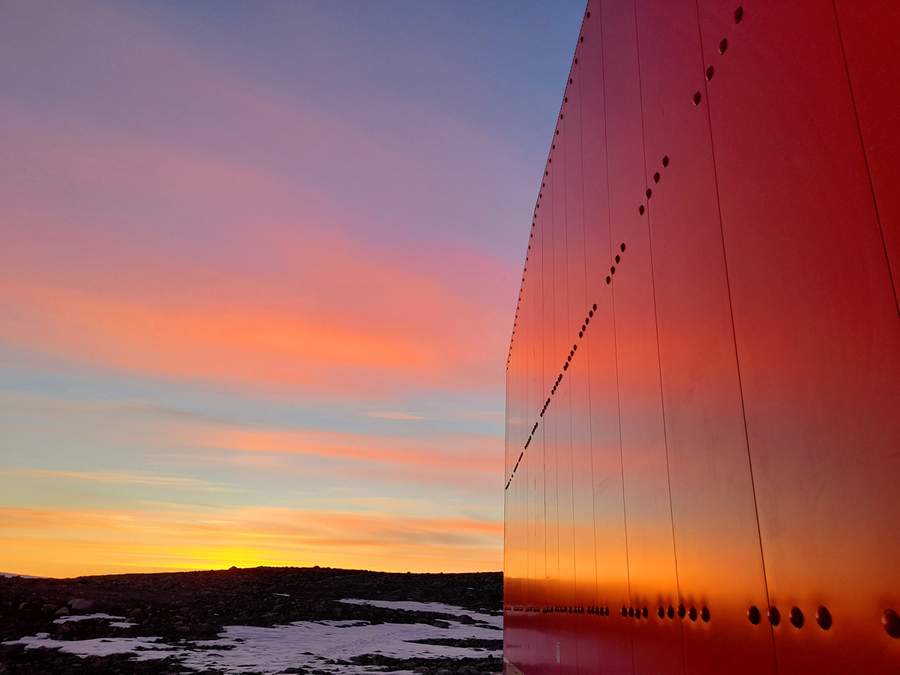
Photo by Cliff Davis
After being a long-time member of the Triple R family, Cliff is now a member of the Radio Marinara team as our Antarctica correspondent and weather reporter. He’s also our inspiration for remote living.
In April, Dr Beach and I caught up with Cliff to talk about his life and experience living remotely at an Antarctic research station, particularly through a long Antarctic winter, and his connection to Triple R during the long winter months of continuous isolation.
Bron: Cliff – welcome to RRR and to Marinara!
Cliff: It’s one of my little “Everests” I’ve climbed; I can finally chat on Triple R!
Bron: Can you tell us a bit about what you do?
Cliff: In the real world I’m a boilermaker/welder. My Dad [went] to Macquarie Island in 1968, so as a child I’d always wanted to come here, didn’t think it would ever happen. One day on SEEK the Antarctic Division popped up and here I am.
I support the essential trades – plumbers, electricians, chippies. And when I’m not welding things that are broken or trying to make little things that are needed, I help the rest of the trades team.
Bron: This is your fourth winter and you’ve done a few summers as well. How long ago was it when you put that application in?
Cliff: It was in ’08 that I first came down, 40 years after Dad went down, so it was pretty cool – a big milestone for me.
Bron: What happened in terms of training? Prior to that, had you spent a lot of time going up to the mountains here in winter, or was it a whole new experience being in that really cold environment?
Cliff: It was essentially a whole new experience. There was a lot of training in Hobart because I was going down for summer, so that’s a bit more of a condensed version than the “winterers” get. There was a lot of training; inductions [were] spread over quite a few weeks.
Dr Beach: [Is] the training that you did how to deal with living in the cold, in isolation, in close quarters with other people? Is it that kind of training on top of the emergency stuff?
Cliff: Correct. You get all of that and it doesn’t stop when you’re down here. There’s survival training, there’s continuous training. A good way of looking at it is if you’ve got a First Aid [certification], you need to keep doing that every few years. The same thing happens here.
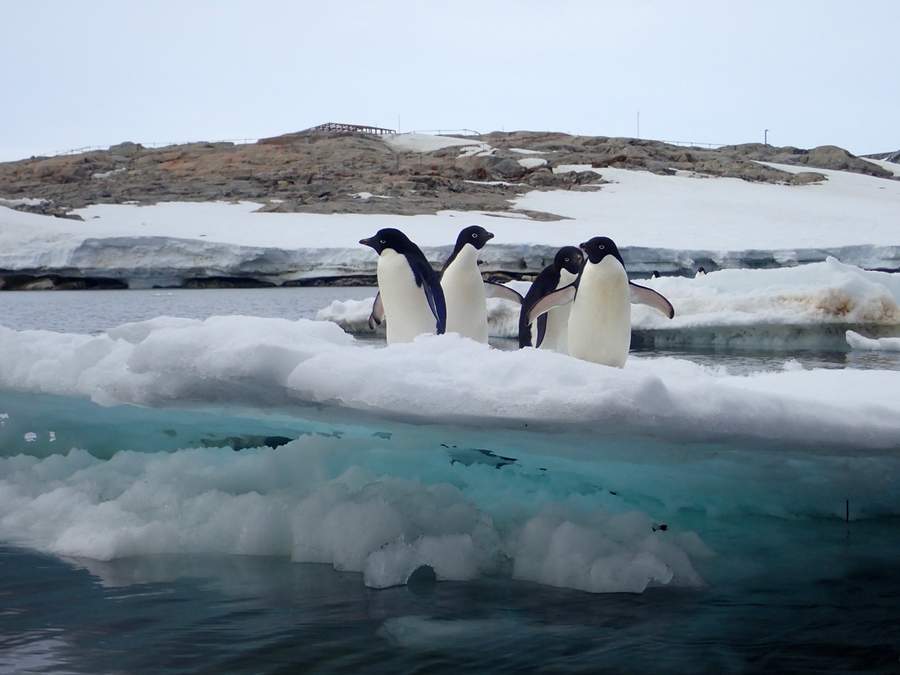
Photo by Cliff Davis
Bron: And I understand you also had training to potentially help the station doctor do surgery. Can you tell us what that training was like?
Cliff: It was amazing! I was freaking out, thinking I’m going to kill a patient because I haven’t scrubbed properly or something worse. I didn’t faint [my] first time in surgery, so that was a win. And having been a patient a few times, I’m just so impressed at how hard those folks work – from the surgeons and nurses to the orderlies and cleaners that do an awesome job.
I got to see and help a surgeon with lung surgery. I saw a beating heart and was shown all the valves working – wow-wow-wow! I didn’t get to do lay surgical training for this season because of damn COVID. Hope I remember some of those lessons if we have a medical issue down here.
Bron: What kind of surgery do you need to be prepared for?
Cliff: Well, everything, I suppose. But there’s only so much our docs can do down here – hence the reason our medicals before we depart are so rigorous. [In] previous years I’ve been down, we’ve had broken bones, a blood clot/embolism (that was scary), allergic reactions to some meds... So touch wood. I haven’t had to scrub up for surgery yet. Nobody on our team wants to have an accident – they know they’ll have me as their nurse, ha!
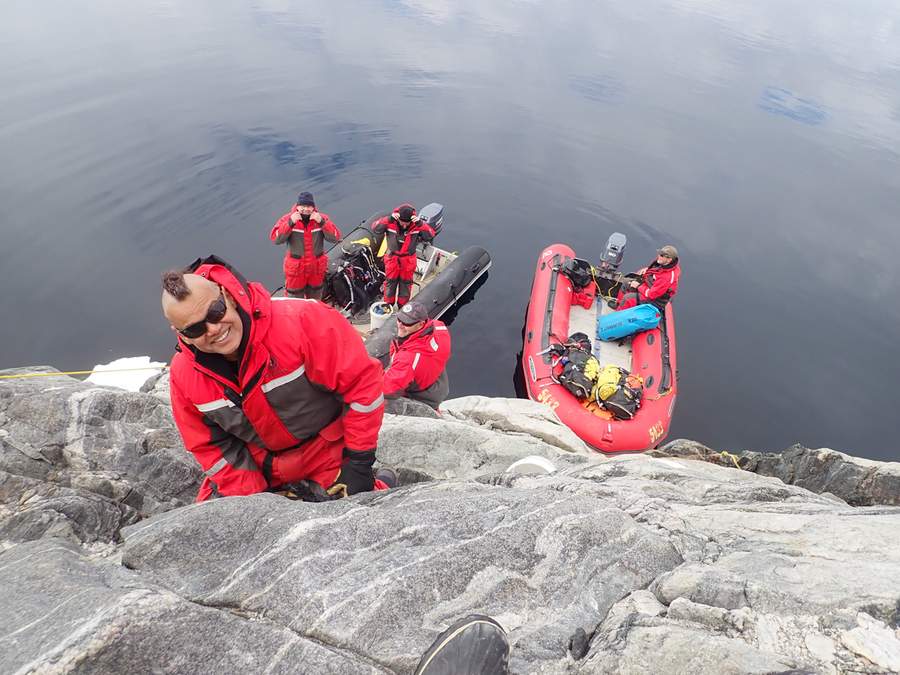
Photo by Cliff Davis
Bron: We’re coming up to 18 months of the COVID era that we’re in. How has that impacted life in Antarctica, day to day operations, planning…?
Cliff: It’s a nightmare. Even worse for polar medicine and station leaders, trying to put social distancing controls in place. At Casey, people were coming in dribs and drabs. There was the first group that came down – that was half of our team, summer and winter. Then [more came] over the space of the next few flights and some came in on the ship. We had to do two weeks of quarantine before we left. Then, just to make doubly sure, once we got down here there was another two weeks of social distancing.
You guys who live in Melbourne know how hard that is. And how do you do that working, as well? They had to set up separate eating areas, masks – all those standard things Melbourne listeners would be well aware of. Then I got some little bug, don’t know how or why. And this was into winter. Then bang – there’s COVID checks done, and until those checks come up good, [for a] couple of days, I’m in isolation. We don’t like it, nobody likes it, but it’s just the reality of health and safety.
Bron: How did you go with COVID testing down there? Presumably you’d need to be fully self-sufficient in what you’re doing, the medicos have their own testing kits and the ability to process them, particularly through winter…
Cliff: The doc and whoever is helping has to put on all the required PPE [personal protective equipment]. They’ve got an amazing diagnostic machine that I think every medical centre in Australia should have. It’s just amazing and it doesn’t take long at all to come up with the results.
Dr Beach: You talked about isolation and living in close quarters with other people. Can you describe your living quarters? We’re looking at you now via Zoom. I can see books on the shelves, a nice comfy armchair…
Bron: You’ve got some indoor plants happening there as well.
Cliff: They’re all plastic! We’ve got hydroponics if we want to smell something green. We’ve got some lovely herbs and plants, veggies growing. We’re actually in the quiet room right now – I’m very loud and people had a big night last night! It’s got all the amenities you need. It’s comfortable. It’s about two metres by four metres. I can pace around, lie down and do stretches before I head out to work, it’s a pretty good place here.
Bron: [Have you worked on all the] other research stations?
Cliff: Yes, I’ve worked on all of them. Lucky me!
Bron: There’s Mawson, Casey, Davis – how do they all compare?
Cliff: At Davis, it’s a large area that stays relatively ice- and snow-free. You can get out a lot more [and go] walking, because there’s fjords and little islands that support the ice really well, so you can do a lot more ice travel.
Over winter there we call it “The Highway”. Same at Mawson. But Mawson’s also got these amazing, picturesque views. You’ve got these mountains – and it’s steep. And it’s very windy most mornings. You’ve got those katabatics [katabatic winds] rolling down from the pole. And the majority of the time for me [I would do] outside work in the afternoon when it warmed up a little bit and the winds eased off.
[There are] a lot of blizzards there. In general, the buildings are relatively similar on the three Antarctic stations. Macquarie Island is just different – and beautiful.
Bron: Through winter at the three stations when you’re all in maintenance mode, I assume there’s an equivalent of Cliff Davis at Mawson and at Davis – do you talk to each other and compare notes on what’s happening?
Cliff: If I have to! I have in previous years contacted other guys for help and advice. Nobody knows everything, and sometimes you’re stuck and you can’t contact your supervisors back in Hobart for whatever reason. There are other people who are very knowledgeable, been down other times, worked on this or that. Even the newbies bring a lot to the team. Every bit of advice is always greatly accepted.
Bron: There’s no research happening at the moment, is there? What time of the year do the researchers arrive again – late spring?
Cliff: Well, hopefully. It’s around the start of summer, November/December. Generally, how it works is most of the science folks have worked for years to try and get their thing together, get their grant money, come down here for a few weeks, gather data [in] whatever shape or form that is, whether it’s marine stuff or soil samples etc., and go home and do all the work they need [to do] on it.
COVID’s put a big spanner in those works, and at the moment a lot of what funding [exists] is going into infrastructure, trying to make this place, all the stations, ready to last another 50, 60 years.
We have weather, though – weather science. So there you go – that’s science!
Bron: Yes! We know – because you’re sending these reports through to us! The report you sent through this morning had an aurora forecast – that was cool!
Cliff: I didn’t see any aurora – that’s not cool!
Bron: False advertising!
Cliff: They’re up there, but they’re hidden by clouds.
Bron: I want to talk to you about your connection to Triple R [...] We know that you love the station. You’ve got 27 people down there at the moment. Presumably you’ve all got different musical tastes and interests, so when it comes time to put on the radio, do you get to have some say in this and put on Triple R?
Cliff: Occasionally Triple R is put on and people don’t realise it sometimes. There’ll be a lot of blues playing in the background and something will happen. The other day, Canned Heat’s “Going Up The Country” came on, and a young lad came up to me, [saying,] “I’ve always loved that song. What’s it called, where’s it from?” It was in some movie that he’d watched.
I’ve sent a few people the links when I’ve heard some really interesting stories – mainly from Sunday morning sessions. Some of the musical tastes aren’t quite as eclectic or diverse as what we’re used to. That being said, there’s stuff I don’t listen to either, but that’s why we’ve got PBS or 3CR – have to give them a plug as well.
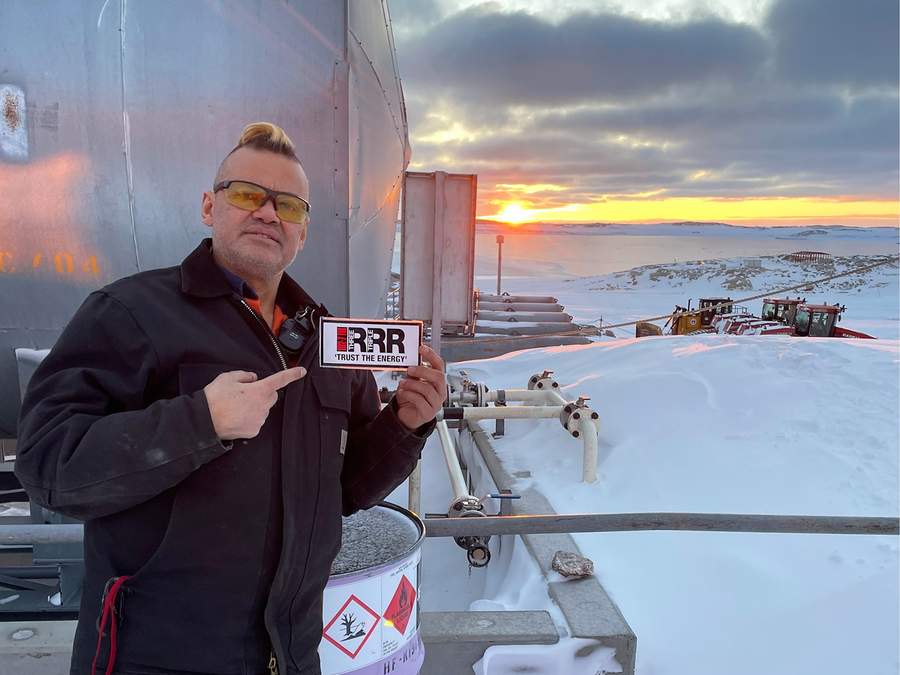
Photo by Cliff Davis
Bron: Yes, definitely. I have a friend who subscribes to all three stations and calls it the “Holy Trinity”. I did want to ask you about your favourite Triple R programs...
Cliff: There’s so many. I start with Vital Bits. On the weekends, it’s Vital Bits, especially Sundays, and Saturdays if I’ve got the time, tuning in to Brian [Wise’s Off the Record] and all you guys with all your science stuff and weird and wonderful things that are happening in doctor world and science world and wet world. Any show that’s playing blues – Max [Crawdaddy], I’ve been listening to for... oh my god, I don’t know how long. The cooking shows [Eat It]! The Grapevine [and] Breakfasters are always good – [as are] Uncommon Sense, Respect The Rock and The Australian Mood.
It’s interesting – sometimes it’s just playing there in the background and I might not be enjoying the tunes, it might be some hip-hop playing or whatever, but then there’s interesting discussion, and you don’t get that on mainstream media in any shape or form.
And we go on about diversity – well, it is diversity. Where else can you hear an African person speaking or a person of Asian background speaking and then hear their music as well? You don’t. So that’s why [I listen and subscribe]. Someone inspired me many years ago and she’s the reason I’m here listening to your show. She signed me up for a subscription.
Bron: Good luck in the weeks ahead, and please keep sending us our weather reports from Antarctica!
Cliff: It’s been fun. Keep up the good work – I’m still listening!
Bron Burton hosts Radio Marinara, bringing you a quirky but informative look at all things wet and salty, on Sundays 9am to 10am. This article first appeared in the Radiothon 2021 edition of Triple R’s subscriber magazine The Trip.